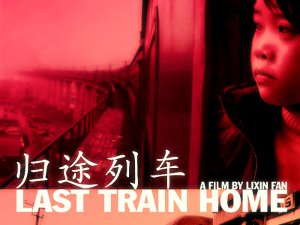Thoughts on 'Last Train Home' (归途列车)
Today I watched the documentary film [Last Train Home](http://www.amazon.co.uk/gp/product/B003ZIZ2RU/ref=as_li_ss_tl?ie=UTF8&camp=1634&creative=19450&creativeASIN=B003ZIZ2RU&linkCode=as2&tag=easasistu-21" rel="external nofollow “Last Train Home [DVD]") (归途列车) by director Lixin Fan. It always seemed like an important film and I’d been meaning to watch it for quite a while. The film looks at the yearly mass-migration of Chinese migrant workers coming back from the cities to the countryside for Spring Festival.

I’d say the goal of of Last Train Home is to explore the everyday human aspects of China’s economic growth, and how this current transition stage affects millions of lives in real, quantifiable ways. I suppose it’s also about the clash of producers and consumers in this new world, with China’s drive for growth and consumers’ demand for lower prices creating this situation where it makes economic sense to disrupt people’s lives in this way.
It is a good film, and manages to leave you with a sense of the lack of privacy and control in the lives of workers who are desperate enough for better work that they will spread their life over thousands of miles to get it. The thing that always bothers me with this type of cinema verité film, though, is that it presents itself as a documentary and I’m never sure if that’s an honest description of it.
Initially I always appreciate the lack of commentary or heavy-handed analysis in this kind of film, but this approach is actually more misleading in the long-run, I think. It’s like reality television that presents itself as an objective, simple portrayal of the lives of the participants, but it is of course edited very carefully, to the extent that it has a scripted plot and message. That’s a shame, I think, as the whole thing ends up being more of a collage aiming to express the director’s imagination than an attempt at objectivity.
I also feel like the camera and crew are actually the catalyst of a lot of the scenes shown in the film, at least because the presence of the camera is quite provocative. This is especially true of the ‘fight’ scene. The directors claim that they spent enough time shadowing the family that their presence was ignored, but I find that hard to believe.
So what we’re seeing in Last Train Home is of course one family’s reaction to the presence of a camera in stressful situations in their lives. It’s impossible to gauge what the impact of that is with any accuracy or objectivity, but if you look at this really cynically, it could make all of the events of the film somewhat meaningless, or at least lacking the kind of meaning the directors want it to have.
Having said that, the film is certainly well-done, generally tasteful and worth watching. I just think it would be more ‘valid’ somehow if the director was more upfront about what the purpose of the film is. I don’t buy any claims that a film doesn’t have to have a purpose, or that the purpose is to show something objectively. Any artistic work that has meaning also has a purpose and a direction, and is subjective no matter what you do.
I think if the film began with “this is our attempt to show that ____ " or “to show you how _____ is _____ “, it would all be much more interesting. As it is, it seems to me like they’re pretending they’ve produced this objective account of something, when everyone knows that they haven’t.
I’d also like to know more about the production background of the film. By that I mean that much more of the process should have been included in the film, like how they found the family, who they have in mind as the audience of the film, what their expectations are for the impact of the film. I’d also like to see the family’s thoughts on the film and their experience of being in it.
Anyway, I’d still recommend that anyone interested in modern China watches Last Train Home, as it’s one of the best films I’ve seen in that area.
See also: Last Train Home - NYTimes review
